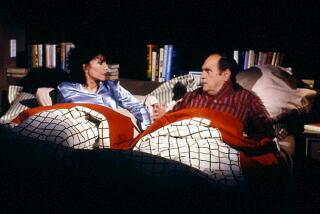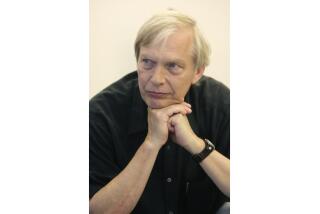Fond Reminiscences of the Glory Days of Radio
- Share via
When the Inner Sanctum’s squeaking door opened, or Buck Rogers whooshed into space or the Shadow was uncovering the evil that lurks in the hearts of men, Gerald Nachman was there, sprawled on his bed eating Walnettos, his bakelite Motorola radio at his side.
He was a boy “whose interior life was largely played out with the little box by my bed” from the mid-1940s to the mid-’50s, when he “was forced to abandon full-time radio listening for college.”
“Raised on Radio” (Pantheon, 1998) is his loving tribute to the medium that, he says, taught him much of what he knows about honor and humor, marriage and manhood. It is also an obituary, for the radio he loved was long since done in by television and by its own predictability. In the words of comic Fred Allen, “Even the sameness was starting to look the same”--soaps, whodunits, quiz shows.
In “Raised on Radio,” Nachman takes us on a 500-page sentimental journey to visit such legendary performers as Jack Benny, “Fibber McGee and Molly,” “Our Miss Brooks,” Jack Armstrong, and Bob and Ray, the enduring team who parodied radio’s own with spoofs such as “Mr. Trace, Keener Than Most Persons.”
Ah, radio. George and Gracie. Ish Kabibble and Parkyakarkus. Throckmorton P. Gildersleeve. “Dragnet.” “Ozzie and Harriet.” “Major Bowes’ Original Amateur Hour.” “The $64 Question.”
It was on radio that most Americans learned of seminal events such as the attack on Pearl Harbor and D-day. And radio gave us the language: “come on like gangbusters,” “meanwhile, back at the ranch” and “faster than a speeding bullet.”
It was a time, the author writes, when a “woman’s place was in the home, listening to the radio and buying endless boxes of Oxydol, bars of Lux and bottles of Lysol.” They were a captive audience for the likes of “Stella Dallas,” “Ma Perkins” and “The Romance of Helen Trent,” and by 1939, no fewer than 61 soaps were on the air.
Little-known facts from “Raised on Radio”: Mike Wallace once announced “The Green Hornet.” “The Lone Ranger’s” Tonto was an elderly British Shakespearean actor. The Lone Ranger actually said, “Hi-yo, Silver.” Little Belle Silverman (later, diva Beverly Sills) chirped “Rinso white! Rinso white! Happy little wash day song!” for “Amos ‘n’ Andy.” Edward R. Murrow was born Egbert Roscoe Murrow in Polecat Creek, N.C. “The Whistler’s” whistle was whistled by a woman who’d dash in from her Lockheed shift.
We learn that the sound of bones being snapped was actually Life Savers ground between the teeth, the crunch of shoes on snow a handful of cornstarch being squeezed.
No fan of today’s radio, Nachman laments that with a few exceptions such as National Public Radio and Garrison Keillor’s “Prairie Home Companion,” it’s “stuck on a relentless treadmill of news-music-sports” interrupted only for weather, traffic and stock updates. Not to mention those shows where “listeners entertain themselves with a babble of opinion, most of it mindless and mean-spirited, whipped on by shrill talk-show hosts.”
For more reviews, read Book Review
* This Sunday: Ann Louise Bardach takes a look at Lawrence Schiller’s “Perfect Murder, Perfect Town: JonBenet and the City of Boulder.” Plus, Joseph Rykwert on Frank Gehry, Edward Luttwak on “Black Hawk Down” and Tom Miller on Cuban baseball.
More to Read
Sign up for The Wild
We’ll help you find the best places to hike, bike and run, as well as the perfect silent spots for meditation and yoga.
You may occasionally receive promotional content from the Los Angeles Times.






